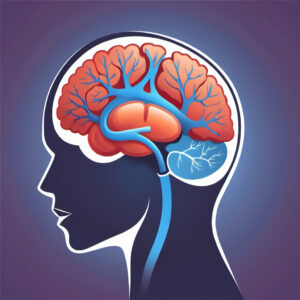Alzheimer’s Disease (AD) is often misunderstood. It’s not just a normal part of aging—it’s a progressive condition that changes how your brain functions over time. For many, the thought of memory loss and cognitive decline brings fear and frustration, but understanding what’s happening in the brain can demystify the process and reduce some of the stigma surrounding the disease.
Imagine your brain as a bustling city. Neurons (nerve cells) act as the citizens, communicating with each other via pathways similar to highways and roads. These neurons send signals that allow us to think, remember, and perform daily tasks. In Alzheimer’s, these highways become blocked or damaged, causing traffic jams that slow or completely stop the flow of information.
The Science Behind Alzheimer’s: Plaques and Tangles
To understand Alzheimer’s, we need to meet its two primary culprits: plaques and tangles. These are not just buzzwords but actual structural changes in the brain that wreak havoc on its normal functioning.
Plaques are clumps of a protein called beta-amyloid. These proteins accumulate between neurons, disrupting their communication. Think of beta-amyloid as construction debris dumped onto your brain’s highways, creating massive roadblocks that hinder neural signals.
Tangles, on the other hand, form inside neurons. They’re caused by a protein called tau, which normally helps maintain the cell’s structural integrity. In Alzheimer’s, tau proteins become twisted and clumped together, causing the neuron’s internal structure to collapse. Picture a building’s steel framework suddenly crumbling—the whole structure becomes unstable and eventually falls apart.
The combined effect of plaques and tangles is devastating. They primarily target areas of the brain responsible for memory and reasoning, such as the hippocampus and cerebral cortex. Over time, these areas shrink, leading to the hallmark symptoms of Alzheimer’s: memory loss, confusion, and difficulty performing everyday tasks.
Alzheimer’s Is Not Your Fault
It’s crucial to understand that Alzheimer’s is not a personal failing. It’s not caused by skipping your kale smoothie or failing to do enough brain-training apps. While certain lifestyle factors like diet, exercise, and mental stimulation can influence brain health, Alzheimer’s is primarily driven by a combination of genetics, age, and biology—things largely beyond our control.
Genetics and Risk Factors
One of the biggest risk factors for Alzheimer’s is age. Most cases occur in people over 65, but it’s not exclusive to older adults. Early-onset Alzheimer’s, though rare, can affect individuals in their 40s or 50s. Genetics also play a significant role. Specific genes, like APOE-e4, can increase the risk, but having this gene doesn’t guarantee you’ll develop the disease.
Other factors, such as cardiovascular health, also influence risk. Conditions like high blood pressure, diabetes, and obesity can increase the likelihood of Alzheimer’s. But even here, it’s important to note that these are contributing factors, not definitive causes.
Common Myths About Alzheimer’s
Let’s address some common myths that add unnecessary guilt and confusion:
- Myth: Forgetfulness means you have Alzheimer’s.
Truth: Occasional forgetfulness is normal, especially as we age. Misplacing your keys isn’t a red flag, but forgetting their purpose might be. - Myth: Alzheimer’s only happens to old people.
Truth: While age is a significant risk factor, early-onset Alzheimer’s shows that it’s not exclusive to seniors. - Myth: Alzheimer’s is caused by aluminum, like from cans or cooking pots.
Truth: There’s no conclusive evidence linking aluminum exposure to Alzheimer’s.
The Importance of Early Detection
One of the keys to managing Alzheimer’s is early detection. While there’s no cure yet, early intervention can slow disease progression and improve quality of life. Recognizing early signs, such as difficulty recalling recent events, trouble solving problems, or changes in mood and behavior, is crucial.
If you’re concerned about memory issues in yourself or a loved one, consult a healthcare provider. They may recommend cognitive tests, brain imaging, or other diagnostic tools to determine what’s going on.
How to Support Brain Health
While you can’t control your genetics, there are steps you can take to promote overall brain health. These strategies won’t prevent Alzheimer’s entirely, but they can reduce risk and support cognitive function:
Stay Active: Regular physical activity improves blood flow to the brain and supports overall health.
Eat a Brain-Healthy Diet: Diets like the Mediterranean or DASH diets, rich in fruits, vegetables, whole grains, and healthy fats, have been linked to better brain health.
Challenge Your Mind: Learning new skills, playing games, or engaging in creative hobbies keeps your brain engaged.
Stay Connected: Social interaction reduces stress and promotes emotional well-being, which benefits cognitive health.
Get Quality Sleep: Poor sleep has been linked to increased beta-amyloid levels, so aim for 7-9 hours of good-quality rest.
Looking Ahead: Hope for the Future
While Alzheimer’s is a challenging condition, there is hope on the horizon. Advances in research are paving the way for better treatments and, potentially, a cure. Scientists are exploring new medications, therapies, and diagnostic tools that could significantly improve outcomes for individuals with Alzheimer’s.
For example, recent developments in drugs targeting beta-amyloid and tau proteins show promise in slowing disease progression. Researchers are also investigating the role of lifestyle interventions and their potential to delay or prevent cognitive decline.
Understanding Alzheimer’s Disease helps reduce fear and stigma while empowering us to take proactive steps toward brain health. Remember, Alzheimer’s is not your fault. It’s a complex condition rooted in biology, not personal choices. By staying informed and supporting ongoing research, we can foster a future where Alzheimer’s becomes a manageable—or even preventable—condition.
If you’re concerned about memory issues or have questions about Alzheimer’s, don’t hesitate to reach out to a healthcare provider or support organization. Knowledge is power, and together, we can make a difference.








